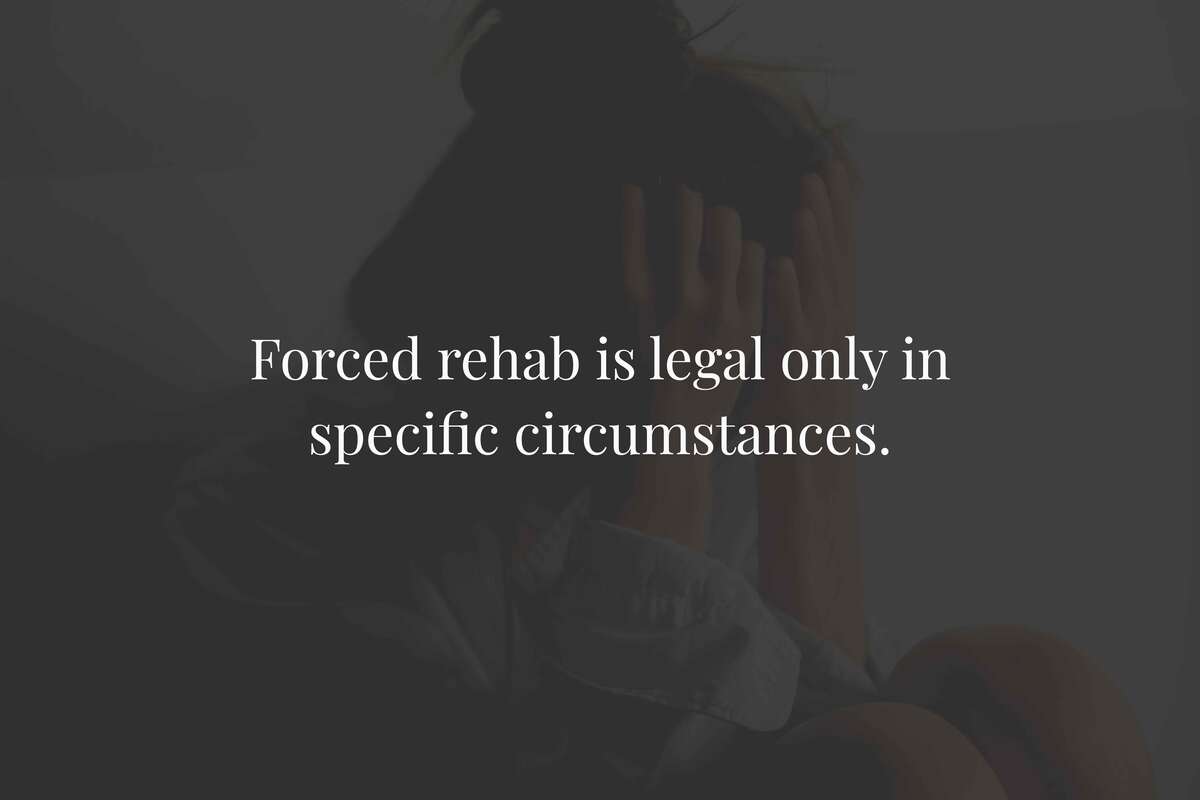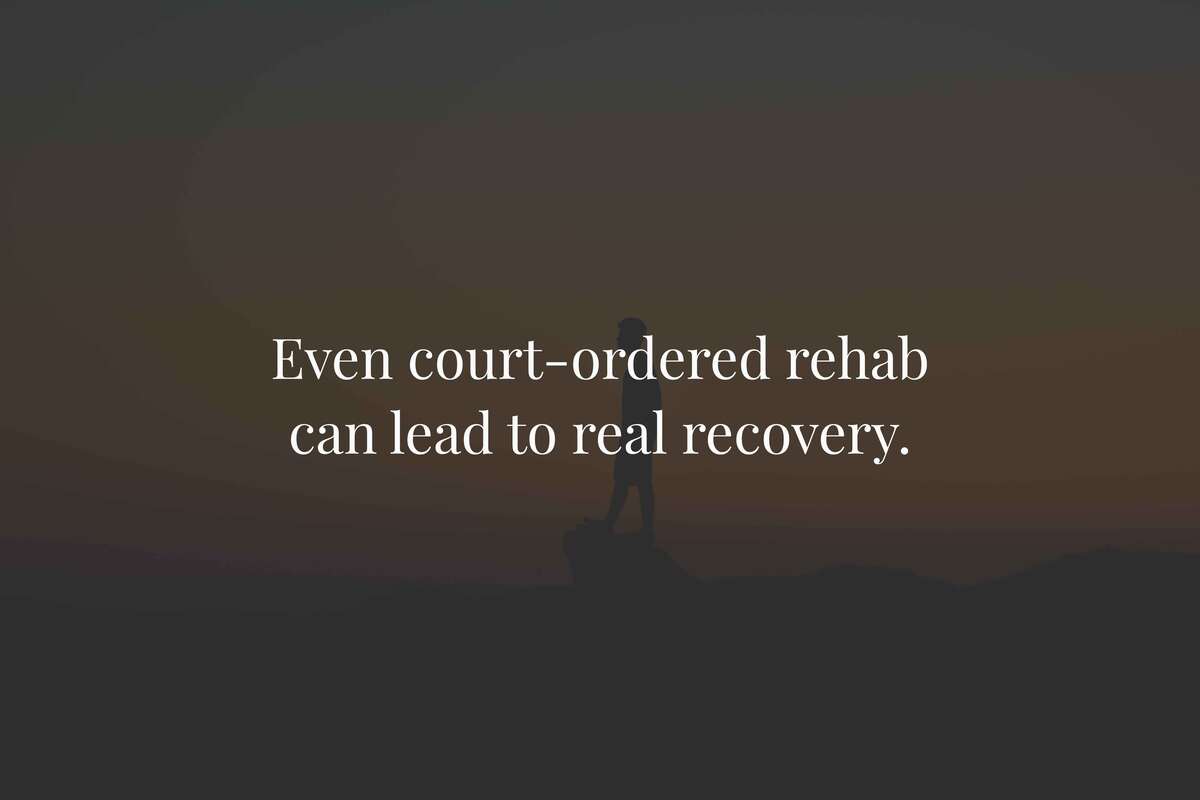The Short Answer
You can sometimes force someone into rehab—but only under specific legal and medical circumstances. Most states allow involuntary commitment when a person’s substance use disorder poses an immediate risk to themselves or others. However, long-term success still depends on the individual’s eventual willingness to participate in treatment.

Understanding Involuntary Commitment
Involuntary commitment laws are designed for crisis intervention, not punishment. They enable family members, physicians, or law enforcement to request a court order mandating treatment. These laws—often called civil commitment or substance abuse commitment statutes—vary by state.
Examples include:
- California: The 5150/5250 process allows temporary psychiatric holds for individuals considered a danger to themselves or others.
- Florida: The Marchman Act permits families to petition for assessment and treatment for loved ones with severe substance use disorders.
- Massachusetts: Section 35 of the General Laws allows court-ordered rehab for up to 90 days when addiction poses severe health or safety risks.
These programs exist to save lives in situations where addiction has stripped a person of rational judgment.
When Forced Rehab Is Legally Possible
A judge can approve involuntary rehab when there is clear evidence that the person:
- Is unable to care for themselves due to substance use.
- Poses a danger to themselves or others.
- Has refused voluntary treatment multiple times.
- Has been medically or psychiatrically evaluated and found severely impaired.
- Once approved, the individual is placed into a treatment facility—often for a short-term stabilization period of 72 hours to 30 days depending on the statute.
The Ethics of Forcing Treatment
Involuntary rehab presents a moral dilemma. Addiction alters decision-making, so refusal of treatment isn’t always a sign of free will—it can be a symptom of the disease. However, forcing someone into care can also damage trust if not handled compassionately. The most ethical approach combines firm boundaries with empathy, making it clear the intention is safety, not control.

Does Forced Rehab Actually Work?
Studies show that even court-ordered treatment can lead to positive outcomes if the person remains engaged once sobriety begins. The first few weeks of detox and therapy often create clarity, allowing internal motivation to develop. According to the National Institute on Drug Abuse (NIDA), people compelled into treatment can achieve recovery rates comparable to those who entered voluntarily, provided they complete the full program.

Before You Consider Legal Action
Legal commitment should be the final step after voluntary options have failed. Try these approaches first:
- Hold an intervention: A structured conversation led by a professional interventionist gives families a chance to express concern without blame.
- Set boundaries: Stop enabling behaviors such as giving money or covering for absences. Boundaries show love through accountability.
- Offer flexible treatment options: Some people resist inpatient rehab but will agree to outpatient or intensive therapy. Meeting them halfway may save months of struggle.
If safety is at stake—such as overdose risk, self-harm threats, or neglect of children—consulting a legal professional or mental health crisis team becomes essential.
The Family’s Emotional Role
Addiction affects entire households. Family members often experience fear, anger, guilt, and helplessness. Seeking guidance from a family therapist helps everyone understand how to support recovery without enabling. Families can also participate in group therapy or 12-Step-based programs like Al-Anon or Nar-Anon to manage their own stress while learning effective communication strategies.
The Process of Involuntary Commitment
If you pursue legal intervention:
- Document everything: Keep records of overdoses, hospital visits, or police reports.
- Consult a legal or clinical expert: They can assess eligibility and complete necessary petitions.
- File a court petition: A judge reviews medical evidence and decides whether to order assessment or treatment.
- Transport to facility: Law enforcement or medical personnel handle transfer safely and discreetly.
- Ongoing evaluation: The treatment team updates the court or family on progress and readiness for voluntary participation.
This process can take days or weeks, depending on the court system and state laws.
When Forced Rehab Fails and What Comes Next
Not everyone responds positively to court-ordered treatment. Some comply outwardly but resist internally. If resistance remains high, focus shifts toward harm reduction: maintaining safety, minimizing relapse risk, and keeping communication open. Recovery readiness often grows over time as the individual experiences consequences and gains insight. Families should remain supportive but firm, offering help only when it supports progress.
Encouraging Voluntary Commitment
Once the immediate crisis passes, the goal is to transition from external pressure to internal motivation. Techniques like Motivational Interviewing (MI) can help shift perspectives by exploring the person’s own reasons for change. Counselors and family members can guide these conversations gently, emphasizing personal values, such as relationships, freedom, and health, rather than punishment.
The Importance of Professional Support
Navigating involuntary rehab laws is complex. Each case requires collaboration between medical providers, attorneys, and addiction specialists. Experienced clinicians help families understand treatment timelines, patient rights, and ethical considerations. Trusted recovery centers like Studio City Recovery can coordinate with legal professionals to create safe, compassionate care plans for resistant individuals. Their structured addiction recovery programs include family involvement, education, and gradual reintegration support.
What Long-Term Recovery Looks Like After Forced Treatment
Even when treatment begins involuntarily, recovery can evolve into voluntary commitment. Many clients who first resisted treatment later credit it with saving their lives. Once withdrawal symptoms subside and the brain stabilizes, clarity often replaces denial. At that point, therapy, peer support, and structured housing can sustain progress.
Conclusion
You can sometimes force someone into rehab, but it should be a last resort reserved for emergencies. The goal is safety, not punishment. Lasting recovery depends on compassion, structure, and follow-up care that helps the person eventually choose healing.



